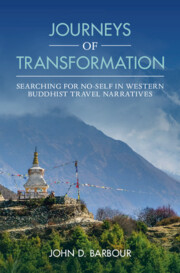
- Publisher:
- Cambridge University Press
- Online publication date:
- March 2022
- Print publication year:
- 2022
- Online ISBN:
- 9781009106337


Western Buddhist travel narratives are autobiographical accounts of a journey to a Buddhist culture. Dozens of such narratives have since the 1970s describe treks in Tibet, periods of residence in a Zen monastery, pilgrimages to Buddhist sites and teachers, and other Asian odysseys. The best known of these works is Peter Matthiessen's The Snow Leopard; further reflections emerge from thirty writers including John Blofeld, Jan Van de Wetering, Thomas Merton, Oliver Statler, Robert Thurman, Gretel Ehrlich, and Bill Porter. The Buddhist concept of 'no-self' helps these authors interpret certain pivotal experiences of 'unselfing' and is also a catalyst that provokes and enables such events. The writers' spiritual memoirs describe how their journeys brought about a new understanding of Buddhist enlightenment and so transformed their lives. Showing how travel can elicit self-transformation, this book is a compelling exploration of the journeys and religious changes of both individuals and Buddhism itself.
‘John Barbour's construction of the genre of the modern Western Buddhist travel narrative (that also functions as spiritual autobiography) is brilliant in drawing a circle around empirical facts and making their identity obvious in hindsight. The truth of this literary phenomenon is made unarguable, and the analytical focus on Westerners struggling between their native and Buddhist senses of personhood portrays how a foreign religion is becoming Western in the experiences and examples of actual lives. This book is a big step forward in the study of modern Western Buddhism.'
Francisca Cho - Georgetown University
‘Focusing almost exclusively on narratives written in English since WWII, John D. Barbour does an excellent job of comparing the written record of over a dozen writers who visited Asia with the express purpose of deepening an understanding of Buddhist existential matters through hiking, pilgrimage, and other forms of travel. The writers in question are grouped according to thematic relationships, and the flow through and around different parts of Asia is entirely successful. The book will be of great interest to literary scholars interested in religion as well as to religion scholars interested in narrative and individual struggles with central concepts. The research is of a very high quality and the book is also wonderfully readable. The prose style is always clear, and the flow is just right. Taken as a whole, John Barbour's book is an extraordinarily rich exploration of Buddhist-oriented travel writing. There is no other book like it.'
John Whalen-Bridge - National University of Singapore
‘This book provides a brilliant alternative to understanding ambiguous Buddhist philosophies by rooting them in travel narratives of various authors whose journey towards enlightenment is palpable and perceivable.’
Alisha Saikia Source: Religious Studies Review
 Loading metrics...
Loading metrics...
* Views captured on Cambridge Core between #date#. This data will be updated every 24 hours.
Usage data cannot currently be displayed.